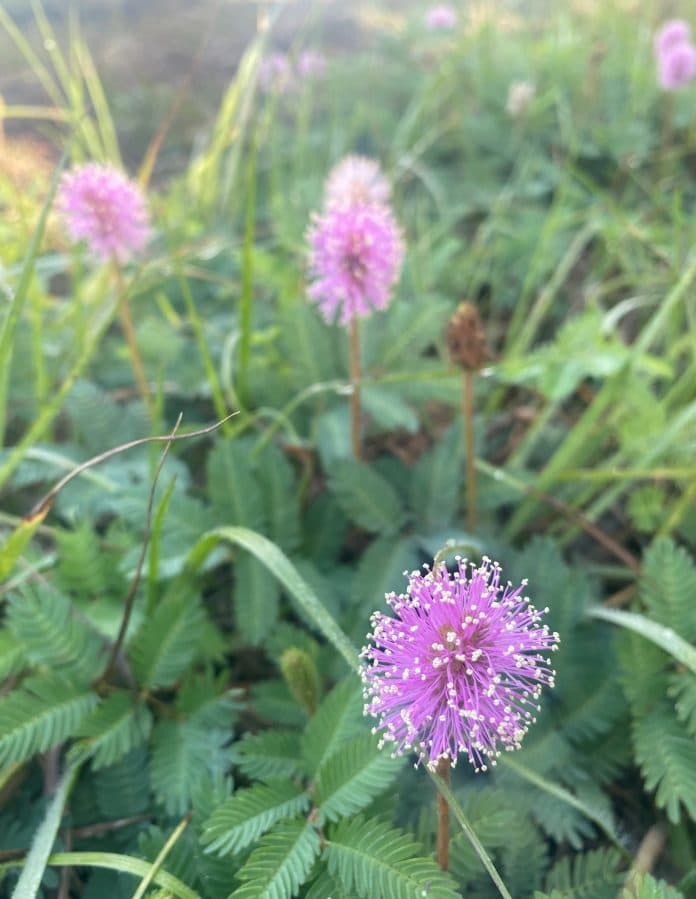On Wednesday, April 14 I was able to join Jim Davis with the UF/IFAS Extension and Mike Singer, Hernando County’s Environmental and Conservation specialist on an interpretive walk in the Peck Sink Preserve, discussing plants and native wildlife.
Centered on a deep sinkhole and swallet that drains directly into the Floridan Aquifer, Peck Sink Preserve is a 112-acre conservation area near Brooksville. Stormwater is filtered through ponds before it drops into Peck Sink. The county acquired it back in 2008 to protect groundwater.
Also along for the hike were two University of Florida interns Rafaella Galvez and Dejah Staton who are conducting a research project through UF’s active learning program. They’re working with Davis, researching the effects of nature on mental health. It has been proven that gardening has a benefit to one’s mental state, so Davis is trying to do the same with his nature hikes. It’s specifically important since the start of Covid, while everyone is experiencing isolation and loneliness, we often forget the benefits that time with nature can bring.
Galvez and Staton spent a good amount of time drafting the survey and they are hopeful to see some good results. Davis plans to use their survey on his hikes in the future and other nature activities elsewhere. They will be working with Davis throughout the summer, attending hikes with him so they can conduct surveys first hand.
On the Peck Sink Preserve property there’s a series of sinkholes and they are a direct connection to the aquifer. The basin for the sinks is about 11,000 acres so surface water from all of southwest Brooksville up until about Powell Road, California Street, that general area, drains into Peck Sink’s basins. This is why it’s important that we have some sort of filtration system for the water entering the basins. The water is traveling a long way, all the while picking up all kinds of garbage, debris, seeds, nutrients, glutens etc. When the county purchased the property they installed a storm water treatment system which helps filter some of the water before it gets into the basins. Protecting the water at Peck Sink Preserve protects our drinking water and our springs.
There are plans for Peck Sink to become a public access park and in doing that they want to build a paved parking area, a paved pathway leading from where you park up until the deepest sinkhole with an observation deck to view it safely. There are also plans for some pavilions, bathrooms, and seating to be constructed. Which will be located in an area that appears to be an open field with a raised trail. This area is actually a bio swell and water retention area, where the storm water drainage filter is located.
Several University of Florida Master Gardeners were present for this hike. I spoke to a member named Diane Hall, who says what they do is “local planting, run a nursery, provide gardening classes, and more.” And they sure showed their knowledge on this day. A majority of the attendees had the answers to all of Jim’s questions and knew the native plant life that we saw. It was impressive to see! According to the University of Florida, “The Florida Master Gardener Program is a volunteer-driven program that benefits UF/IFAS Extension and the citizens of Florida. The program relies on dedicated volunteers who have an interest in gardening and in giving back to their communities.”
One thing none of us knew was that Peck Sink is an archaeological site. There were workers on site conducting a cultural research study to make sure that the planned improvements can be completed on this land. They were shovel testing the grounds every few feet to check for archaeological findings. This way construction can be done while preserving the land’s history.
The benefits of nature are vast. The informative hike around Peck Sink was an amazing experience, soon all of Hernando will get to see the beauty for themselves. Public access is still not provided to Peck Sink Preserve except by appointment. But plans to make the preserve into a public overlook area are in the works!

